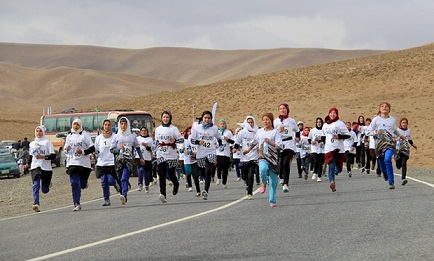Monday, 26 October 2015
We gathered in a cold wind, on the plain above Qarghanato. To the south were the peaks of the Koh-i-Baba Mountains, covered with fresh snow. Ahead of us lay the challenge of the road to Bamiyan …
To western ears such as mine, these names sound like those from a fantasy tale. This was no fiction, though, but Afghanistan’s first ever marathon.
Held in Bamiyan, high in the mountains west of Kabul, the race was an attempt to prove that, despite the challenges faced by Afghanistan and its people, it is possible to look beyond headlines of conflict, and to get things done. Through running, hopefully people from different groups, faiths, nationalities and genders could all be a part of a positive story for the country. At least, that was the plan.
Clearly though, there were challenges. Day one in Kabul, for me, was also the day of a suicide attack on a UK convey, and a fatal helicopter crash at the city’s airport. The UN was in “white city” mode – its highest security setting – and my own look around the city was furtive. Clad in brown shalwar khameez, I kept my head down while visiting the Gardens of Babur and the ruined Darul Aman Palace, shattered by decades of war. “Many martyrs died here,” my guide told me as we stood in one passageway, watching as an aged gardener tended sweetcorn in a courtyard below that once hosted a king.
A newly confident Taliban, attacking Kunduz in recent weeks, meant preparations for the race were anything but normal. Race dates would usually be publicized to get as many runners and crowds as possible, but, here, the organizers had to take a different approach, keeping the details quiet and maintaining a low profile to avoid creating a potential target.
Endless cups of green tea had to be drunk with the right people, helping to ensure that the various local authorities (governor, police, army, faith) were supportive. But drinking chai sabz was a small price to pay for James Bingham, the Brit whose previous experiences climbing in Afghanistan had led him to organize this race.
It would have been a wonderful photo opportunity to start and finish the race beneath the famous niches where huge statues, blown up by the Taliban in 2001, once stood. But the decision was made to keep the race out of the center of town, following instead the route to the stunning blue Band-e-Amir lakes.
So, there we were, on that cold morning, with the wind blowing chill from the mountains. Intrepid athletes from Canada, the US, and Belgium joined a number of British runners. Pashtun runners too – such as Baryalai Saidi, a former madrasa pupil, now inspired byKilian Jornet to run in the land mined mountains near his Kabul home.
Many others were local Hazara girls, who came to the race through Free to Run – an inspirational organisation founded by human rights lawyer (and ultramarathon runner) Stephanie Case, working with women and girls in conflict areas to give them confidence and education along with exercise. No less competitive than their male counterparts, these girls set off at a terrific pace, barely able to wait until the countdown (penej – chehār – seh – do – yek) reached Go.
For many this was to be their first ever marathon, and at around 3,000m above sea level, it would not be easy. Sustained by local watermelon, and cakes from a local women’s cafe, we ran over a high plateau, and then through the iron-stained gorge of the Bamiyan river beneath the spiked towers of a ruined qala. Donkeys crossed our way, laden with fodder, and fields of potatoes alongside were being harvested by families keen to bring in their crop before the onset of winter. Children (and adults) gazed with slightly bewildered looks, before cracking into smiles and giving waved salaamsof welcome.
For tiring local runners, perhaps unfamiliar with marathon etiquette, there were the temptations of friends offering lifts on motorbikes. I was tempted, too, especially up the climbs, hard going at this altitude. But, cake-powered, I continued.
As ever, the marathon passed slowly – more than six hours for many. But finally it did pass, and the day’s labours came to an end on a desert hilltop overlooking the rich valley below. We were a proud group of runners, receiving prizes and recognition from an equally proud governor.
So, what was achieved? Well, as Baryalai put it: “Every run is a victory.” And that, hopefully, was felt by everyone who took part – fast or slow, local woman or international visitor. A stranger told me a few days later, “Congratulations, you are hero” – without knowing that I had been first to finish. Faced by a host of challenges, that the race even took place was a victory in itself, showing that things can be done, life can be lived, and people can come together through things other than war. And together, we were able create an undoubted ‘good news story for the Afghan media, a rare event.
The first Marathon of Afghanistan took place on Friday 16 October 2015. The event is planned to run again in 2016. marathonofafghanistan.com.
Source: the guardian




